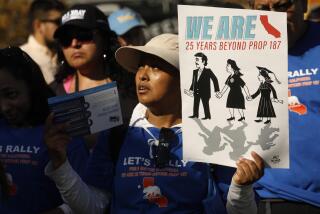Santa Ana’s mayor marches to his own beat
The problem is, Santa Ana Mayor Miguel Pulido isn’t Antonio Villaraigosa.
Or Fabian Nunez.
Or Nativo Lopez.
The problem, however, doesn’t lie with Pulido. It lies with those who think -- make that insist -- that the mayor be someone he isn’t. While the other three gentleman have, to varying degrees, taken on the immigration issue, Pulido seems to put it way down the list of things he wants to talk about.
That has long rankled Pulido’s critics, who lament his seeming lack of zeal for the Latino immigrant community that largely defines his city. If he won’t lead immigrant-rights demonstrations in Santa Ana, can’t he at least lend his voice to their cause?
Yes, he could. He actually has a pretty good personal story that could play well with the masses. He’s good-looking and well-spoken and could be a significant player in any immigrant rights debate.
He just doesn’t want to be.
During a 40-minute conversation in his office last week in which he could have, at any point, made a stirring pitch for immigrants, he didn’t. He makes it clear he sees it as a federal issue, but even beyond that, it just doesn’t seem to be a subject that intellectually stimulates him.
To which I say: So be it.
I’m of the crazy philosophy that people ought to run their lives the way they want. It irks me that Pulido has been knocked over the years for, as he says in paraphrasing his critics, “not being Hispanic enough.”
Yes, any politician’s priorities are fair game. But the sniping at Pulido from the more activist elements in the immigrant-rights debate seems inevitably to take on an ethnic profiling dimension that bothers me.
Your last name is Pulido; let’s get on board!
The mayor, of course, is thrilled to hear I am not among his critics on this issue. We met to discuss it in the aftermath of the immigrant rights demonstrations earlier this month in Santa Ana and Los Angeles. Pulido was criticized last year for not appearing; this year, he made a token appearance but didn’t add any passion to the cause.
Some people are marchers, some aren’t. Pulido says he told people this year he’d make brief remarks but that he wouldn’t march.
Why not?
“Whatever I try to do, I try to do it directly,” he says. “If I want to talk to [California Sens.] Feinstein or Boxer, I go to them. I just try to get work done. So, it’s not in my nature to be in the street with the signs. I just haven’t done that. I know a lot of people have. In the 1960s there were a lot of marches over Vietnam, and in our history there are a lot of cases where people have gone to the streets. There’s a place for that in society. It’s just not something I have done.”
Because of temperament or philosophy? “There might be some blending of those,” he says. “I don’t know if temperament is the word I would use. It’s just nature or style. It’s just not something I have been comfortable with.”
But would it kill you to carry a sign for a couple blocks? “What would you want the sign to say?” he says. I suggest the ever-popular “Si, se puede” (“Yes, we can”). He is amused, but then digresses to say it isn’t his place to tell Congress what to do about immigration or, even, to second-guess them.
Fine, but why not march? “To me, it’s more than that,” he says. “Maybe you please one group, but what do you say to another group? I really want to be a person responsible as much as possible to everybody.”
That’s been the traditional gripe with him, that he’s overly concerned about offending the city’s non-immigrant constituency. And it’s that gripe that gripes him, because he sees no reason why he should be identified with the immigrant population.
Pulido, 52, was first elected mayor in 1994. When his current-two year term expires in 2008, he plans to run again. Although he’s been interview-shy from time to time over the years, he seemed willing to tackle the rap on him for not being more visible on immigrant issues.
“If I were a Curt Pringle [the white mayor of Anaheim], would anybody be saying how come he’s not out there marching?” Pulido says. “And in a way, they’re discriminating -- inverse discrimination, so to speak -- against me, by making the assertion that because I’m Hispanic, I’m at fault for not participating.”
He notes that his critics on the issue generally are other Latinos. “If I had a different heritage, they’d have a different conclusion,” he says. “That goes against all that I stand for, because I want to treat everybody the same and I want to be treated the same way.”
When I then begin to ask how he wants to be judged on the issue, he says firmly, “As a mayor. Not as an Anglo mayor. Not a Hispanic mayor. As a mayor.”
Another mayor in a heavily Latino city might play it differently, I suggest. “Correct,” he says.
“But don’t say that because this mayor is Hispanic he’s got to behave this way. That really gets to me, because then the implication is that you are different and should behave differently because of that. And to me, I am an American first.”
The irony is that he has a good immigrant story to tell, one he’s told many times. Born in Mexico City, he came to the U.S. with his parents when he was 5, unable to speak English. As he was leaving for school, his mother put a note in each of his front pants pockets -- one giving the bus driver his name and address and the other telling the teacher he needed to use the bathroom.
From that humble start, he has made it. When I say that would be a powerful story to tell at an immigrant-rights demonstration, he replies, “That would be too simple. I am more complex than that.”
He clearly doesn’t identify himself along ethnic lines. He eschewed activism as it brewed during his college days in the 1970s at Cal State Fullerton, being more interested in engineering and tennis and French class. His wife is of Scandinavian stock, and he’s been to the upper Midwest and has seen how those European cultural groups hold on to their heritage while assimilating into America.
Personal style. Personal philosophy. Life’s experiences. Political calculation.
For whatever reasons -- and perhaps all of them -- Pulido has gone his own way on immigration. He insists he’s no longer bothered by critics, who basically have given up on him, anyway.
Far from me to tell him what issues should drive him. Pulido says he respects hard-working immigrants, legally or illegally here, but then feels compelled in the next breath to take note of those who come and commit crimes.
All in all, he says, a complicated issue.
“I kind of see myself,” Pulido says, “where as in many ways I’m very Mexican because I came from Mexico City, but I’m very American because I was the kid who had to have two notes in his pocket, and I figured it out. And now I feel an obligation to help other people figure it out and integrate and assimilate and become positive contributors to society.”
*
Dana Parsons’ column appears Tuesdays, Thursdays and Saturdays. He can be reached at (714) 966-7821 or at
dana.parsons@latimes.com. An archive of his recent columns: www.latimes.com/parsons


